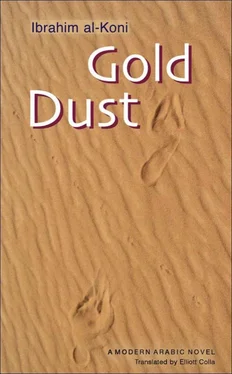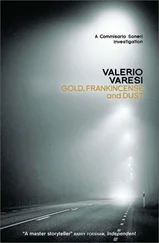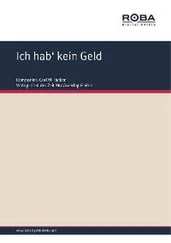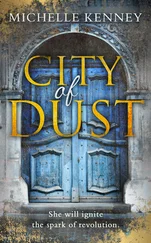He met alone with Dudu and handed him the paper, the document of his surrender and deliverance. The writ was his emancipation from the noose, the doll, and the illusion — forever. Dudu was ecstatic. He ordered his servants to bring some tea and prepare them supper. “I knew you’d do it,” he exclaimed. “And it’s a good thing you did, too. You have broken your fetters and regained a true friend. I could see it in your eyes and his since the very first day. The truth was right there, hidden in your eyes.”
He smiled and went on, “Who would ever trade a giraffe like this piebald of yours for a woman, even if she were a goddess of beauty like Tanit? God forbid you ever did such a thing! But isn’t our entire fate inscribed on our foreheads for all to see?”
From an iron box he took out an old leather pouch engraved with magic amulets. He dipped a teacup into it twice. The gold dust flashed, blinding the eye.
The yellow rays of twilight were reflected in the yellow specks and, in seeming response, the gold appeared to radiate from within.
Dudu pushed the pouch toward Ukhayyad, saying, “Don’t think of this as a bribe. Think of it as protection from the evil of necessity until the famine has passed.”
Ukhayyad answered, “I don’t think I’ll need it. In our tribe, gold is said to bring bad luck.”
The man ignored the second half of what Ukhayyad had just said. Instead, he commented on the first part: “Not only do humans need gold, but jinn need it as well. It is the source of the struggles between humans and jinn, between humans and Satan, and also among humans. How could you not need it? Because of it, I was held prisoner and tortured by the blacks of Bambara. But also, without it, I could not have accomplished what I have.”
He waved the piece of paper in the air and smiled. Ukhayyad reminded him with naive determination, “But they say it is cursed and brings bad luck.”
“Those are myths spread by people incapable of attaining it. Gold is the goal of every person, from when they are born till the moment they die. It’s what everyone wants, everyone that is, except losers and Sufi dervishes. Losers and dervishes revile it and spread their nasty rumors about it for only one reason: they don’t know how to get it! Believe me!”
A flash sparkled in the man’s eye as he spoke.
In the fertile southern pastures below Jebel Hasawna, the piebald recovered his vigor.
One low-lying valley in particular had received the rains of passing clouds at the end of last spring. None of the experienced herders had gone there, because the rains had arrived so late. After leaving Adrar for the northern desert, Ukhayyad had stumbled upon this valley. He had decided to stay put there. Leaving the camel in the green pasture he took refuge in a cave on the western slopes.
He decided to settle here, not only because the place was a reward from God, a green treasure hidden from other travelers and herdsmen, but also because he had discovered another treasure there as well — desert truffles. He had not eaten them since settling in the wretched oasis. Once a man has tried such truffles, he spends the rest of his life longing to taste them again.
In those hidden fields, the piebald recovered his muscle, fat, and gleaming coat — and Ukhayyad savored truffles for the first time since his long exile in the oases. The truffles were like a reward for all his patience and suffering.
But the real compensation was not to be found in the truffles, nor in the piebald’s regained health. The prize was in the pure presence of God that can be found only in the quiet emptiness of infinite wilderness. Only those who have been shackled by life in the oasis can know the meaning of serenity. Such serenity means nothing to those who have not experienced the fetters of family and shame, not to mention the worries of life and the machinations of men. By day, such men labor stubbornly. By night, they are insomniacs — and their chains become only tighter and more jagged. As soon as such a man breaks one knot, he discovers new fetters around his hands and feet, strangling him like serpents. They are like drowning men — however much they raise their heads and dream of rescue, strong currents tug them under. People say that in the vineyard spring there lives a demon who is skilled at this kind of sport. He does not try to drown his victims unless they come to swim alone. He never attacks those who come to swim in groups.
These are the traps of sedentary life in the oasis generally — for that demon did not just haunt the vineyard spring, but the entire oasis.
Here, on the other hand, demons die of thirst, leaving two expanses to reveal themselves — that of the open desert and that of the heart. Here, there was a stillness of the ears, and a stillness of the heart. There was God’s presence in the desert, and His presence inside a man’s chest. And while the waters of the vineyard spring may wash clean the body, only the desert can cleanse the soul. In the desert, the soul empties and clears and becomes free and brave in the process. And so it enables you to defy the endless open space, challenge the horizon, and explore the emptiness that leads beyond the horizon, beyond the desert void. It invites you to face the other world, the hereafter. It was here, only here, in the labyrinths of never-ending desert plains, that the extremes converge — open expanse, horizon, and desolation — to form a firmament that expands outward, toward eternity, toward the afterlife.
This celestial union weaves together the threads of God’s presence, and plants stillness and calm in the heart. He had heard Sheikh Musa repeat this mantra so often that Ukhayyad began to think it was a sura from the Qur’an — the Sura of Serenity. He had never known what it meant until now — after tasting life in the oases, after wrapping himself in devilish chains like everybody else does in the world. He had traded his freedom for a noose and a doll and an illusion, and told himself the same story as everybody else, “This is what we found our forefathers doing.” Now, he grasped the meaning of this mantra. When he heard it from Sheikh Musa and learned it by heart, he never realized that he would someday be traveling down the road it described: Abraham’s people stubbornly insisted on worshiping idols simply because they inherited the custom from father to son. Meanwhile, Ukhayyad had done the same: he married and begot a child and built a special place in his heart for shame — so as to confine himself with fetters stronger than any iron chain.
He forgot about the verse, the sura, the magic spell. He forgot about the words that opened up secrets — serenity, freedom, the presence of God. He had forgotten them simply because he had left the desert and placed his neck in the shackles of settled life in the oases. The inhabitants of the oases were nothing but slaves. No one but a slave would agree to live behind walls or under a mud roof. And Ukhayyad had been a unique kind of slave — a blind one. He had been unable to recognize that his own soul was being enslaved. He had not been slave to another man, but slave to a devil, which was surely worse. A man who is slave to other men arouses pity, but a slave to demons makes you cringe with disgust. The piebald had saved Ukhayyad from this repugnant form of slavery — he was a divine messenger. Were it not for the pure animal, he would have continued following in Satan’s tracks, and perished along with so many other lost souls. The piebald was his savior, the vessel that would deliver him to freedom. And here they were, racing like gazelles across God’s wide desert — that everlasting desert stretching from here to the hereafter.
Goodbye broken chains. Goodbye to the cage whose bars were stronger than those of the prisons the last Ottoman governor left behind when they evacuated the oasis.
Читать дальше












